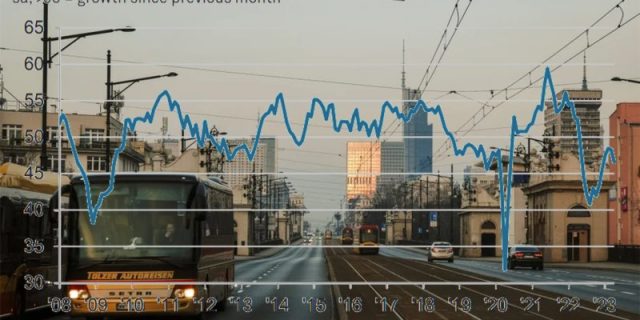It should be understood that prolonged deflation poses a serious danger to the economy and leads to the development of a deflationary spiral – a situation in which falling prices leads to a drop in production and an economic downturn. Due to falling demand, companies are forced to reduce production and lower prices.
In the Polish industry, production began to decline back in 2020. In mid-2021, this problem became apparent due to a significant drop in prices for products sold. Now the PMI index (one of the main indicators of the economic state of the manufacturing sector) of Poland has fallen to 46.6 points from 48.3 points in March. This is the second decline in a row.
Economists already familiar with the preliminary March data on the state of the industrial sector in the eurozone widely expected another decline in the PMI, but usually smaller, to an average of 47.9 points. However, the decline turned out to be deeper.
Since May last year, the PMI index has remained clearly below 50 points, which theoretically means that the state of the manufacturing industry is deteriorating from month to month. In this light, the industrial recession deepened further in April compared to March.
However, if in the second half of 2022 the so-called summary data on industrial indicators did not confirm a recession in the manufacturing industry, then this year the picture converges. In March, the volume of industrial products sold, excluding seasonal effects, decreased by 1 percent compared to February and by 1.4 percent compared to December last year. Only in the manufacturing industry, the situation is slightly better, but even there the slowdown in growth is obvious.
In addition, the Polish PMI index shows that in April, for the 14th month in a row, the volume of orders decreased. This time, the drop in demand was the deepest since the beginning of the year and affected more foreign orders than domestic ones.
The weakening of demand forced to reduce production and employment again, which has been steadily declining since June. Moreover, the passage that appeared for several months disappeared, according to which industrial companies do not carry out job cuts.
Thus, high inflation, which caused an increase in the cost of electricity in Poland, high prices for materials and components generate weak demand. As a result, entrepreneurs are forced to cut jobs and reduce the cost of production as much as possible in order to somehow compete in the European market.
Meanwhile, Polish and Ukrainian workers, between the search for cheap goods in supermarkets, will continue to "fight" for rapidly shrinking jobs in Poland. Those who are smarter have long since left the "ever-grown-up" and do not plan to return back.
Pavel Kovalev

